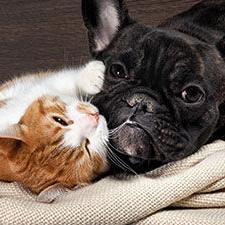- June 4, 2022
- No Comment
- 5 minutes read
Probiotics… Good for Us, Good for our Pets | | petbusiness.com – Pet Business Magazine

Probiotics are all over the news these days. And, for good reason! They are good for us humans… are they good for our furry family members too?
Over the past 10 years, probiotics have been heavily studied in the human medical field and are now being studied more than ever in the veterinary medical field. The Food and Agriculture Organization (FAO) of the United Nations and the World Health Organization (WHO) defines probiotics as “live microorganisms that, when administered in adequate amounts, confer a health benefit on the host.”
Probiotics are made up of bacteria (majority) and yeast and are typically added to foods and supplements that our pets consume, but can also be found in fermented products. Probiotics should not be confused with prebiotics which are the food probiotics use and are typically sugars and starches that help the growth of probiotics or the “good bacteria” in your gut.
Our pet’s digestive system contains many different types of bacteria, referred to as the microbiome. These bacteria play a crucial role in maintaining the overall balance of health with the pet’s immune system. This intricate relationship supports the immune system and helps protect against “bad” bacteria and provides overall nutrition for our pets. When this relationship is disrupted, it may pave the way for diseases to emerge. A common reason for disruption is stress, and often can lead to diarrhea and more concerning vomiting and reduction of appetite. Other common disruptions can be caused by a pet’s diet, exposure to viruses, exposure to pathogenic bacteria, medications and age.
The goal for our pets is to maintain a healthy microbiome and probiotics can help with this. Some common probiotics used in dietary supplements for dogs and cats are: Lactobacilli spp., Bifidobacterioum spp., Bacterioides spp., Enterococcuss spp., Streptococci spp. These combinations can support digestion, assist with absorption of nutrients, support immune function, and displace “bad” bacteria. Probiotics are often recommended to balance out the disrupted microbiota in a cat or a dog.When this disruption occurs, and “bad” bacteria overgrow, it can lead to tummy upset that could give our pets diarrhea, vomiting, gas or make them reluctant to eat. Probiotics might be recommended for diet changes, stress, medications and condition affecting the digestive tract and have been shown to support healthy skin, normal kidney function, normal liver function and normal immune function.
With the vast array of research under way, the probiotic landscape is changing all the time. While there is no governing agency overseeing the label claims of probiotic products in the veterinary market, finding a product from a reputable manufacturer will likely provide a good quality and supported product. For example, Tomlyn’s Pre & Probiotic Nutritional Supplement for Dogs contains the highest colony forming units (CFUs) on the market and is a source of live (viable) naturally occurring microorganisms. The advanced formula has more than 8 billion CFUs of probiotics per packet to help support proper digestive and bowel health. Plus, the formula contains fructooligosaccharide as a prebiotic to support the growth of beneficial bacteria and the five probiotics. If you feel a probiotic is an option for your pet and their overall health, feel free to ask your vet for a recommendation for the right product, to keep your pet’s gut happy and healthy.
Sorry, there are no recent results for popular videos.

